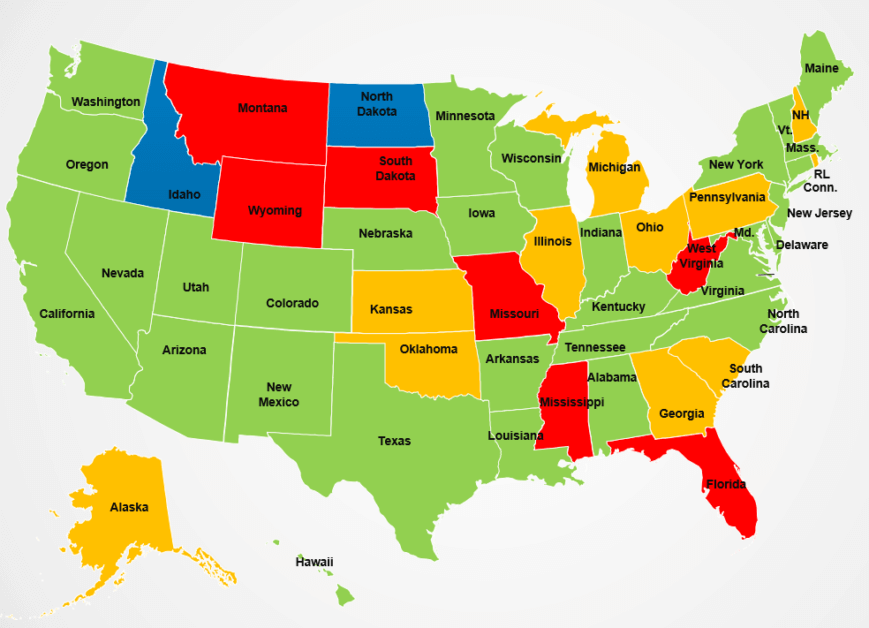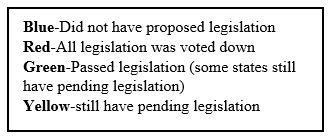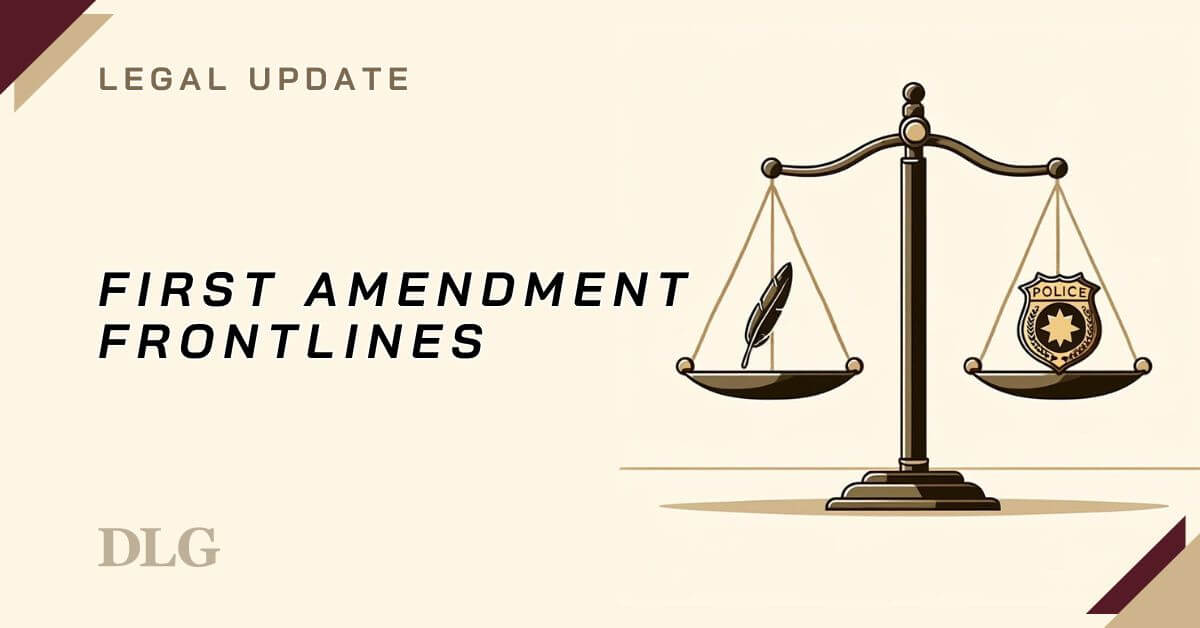The death of Eric Garner in July of 2014 in New York City marked the beginning of a constant focus on police use of force against communities of color. Garner’s death started the “I can’t breathe” movement, which continues today. In August of 2014, Michael Brown was killed in Ferguson, Missouri, resulting in Black Lives Matter, launching Campaign Zero. Since Ferguson, the saturation and content of media coverage on police can be associated with the volume of state legislation on policing. Between 2015 and 2016, thirty-four states passed 79 laws affecting policing. The 2020-2021 legislative session resulted in an all-time high in proposed legislation focused on controlling police policies and practices. As a law enforcement community, we should remain vigilant by creating and maintaining policies based on best practices, investing time in training, and dedicating resources to the political process.
Make Policy Changes
Forty-eight states have proposed legislation that would have a negative impact on law enforcement or require a change in practice or policy. When policy items become a requirement under new laws, they frequently result in significant consequence for officers that may include suspension, decertification, personal liability, and criminal sanctions. Duty to report misconduct, limiting shooting at moving vehicles, banning carotid hold and chokeholds, and requiring intervention were consistent themes across the country. Banning chokeholds and requiring intervention were two of the most consistent legislative items with twenty-six and thirty-one states passing new laws. All four of these topics should have already been in department policies and training curriculum. Regardless of state mandates, all agencies should have prohibitions on these issues. Nineteen states proposed banning or reducing no-knock warrants, making this another area that should already be covered under policy by implementing risk assessment tools during the application and implementation of a warrant.


Invest More Time in Training
Nothing is more frustrating than the narrative that police officers are highly trained. Common practice continues to be taking the most inexperienced officers and providing them months of training with almost no opportunity to apply it. Throughout the next twenty to thirty years, we will provide less training than an average high school athlete. When in-service training is given to officers, the precious hours are dedicated to high liability, low frequency subjects like firearms and officer survival training, neglecting necessary skills that are now being required by some state laws. Properly obtaining consent before searches, de-escalation, CIT, duty to intervene, and cultural diversity training are now mandatory in some states. There should be no objection to any of these topics in training. The objection should be how the training is conducted and the content of the training. As a longtime trainer, I am all too familiar with finding the correct method of instruction with the most interactive content, delivered in an influential way. Training is not a one size fits all activity.
When officers are provided training in what is sometimes viewed as “softer” skills, classes are usually an hour or two long and they stand alone instead of combining them with firearms, use of force, and tactics training. Officers tend to dismiss some of this information as they gravitate toward more high intensity training, aka “the fun stuff”. Law enforcement has the knowledge, skills, and dedication to create a wide range of training that will far exceed any training requirements that have been mandated by some states. There is a catch though; the law enforcement community must devote the time and money to develop and train officers in the wide range of topics that should be important to us as public servants. Showing a significant effort in this type of training will help officers buy in to the importance of these topics.
Another hot topic in law enforcement continues to be engaging with those in mental health crisis. Finding innovative ways to limit force on those experiencing mental health crisis must be something that should be regularly trained, no exceptions. Departments should develop a practice of making tactical considerations that do not escalate someone in mental health crisis and develop scenario-based training to reenforce appropriate responses to these challenging calls. There is legislation in three states that specifically limit the use of deadly force on individuals threatening self-harm. There should not be legislation on this topic, just better and more training in this crucial area.
Engage in the Legislative Process
In late 2020 polling from Gallup reported that police officers ranked an all-time low in U.S. ethics ratings.[3] With all that took place in 2020 it is not surprising that law enforcement had its worst showing. Actions of the police dominated every conversation: media broadcasts, social media posts, and even the introduction of empty streets due to a worldwide pandemic that could be quickly filled with protests. When it comes to ethics, we were fifth. That’s right, we dropped to fifth on the list of most ethical professions behind nurses, medical doctors, pharmacists’, and teachers. Only five professions were rated as highly ethical by the majority of Americans. The Pew Research Center recently reported that Americans supporting an increase in funding for the police is up from 31% in June of 2020 to 47%.[4] Zero states supported defunding the police over the last year.
Being a police officer is one of the most respected professions and it’s time we start acting like it. Law enforcement attracts the most dedicated, purpose driven people and our mission is something to be proud of. Police leaders can sell what we do because it’s authentic service to our communities. When legislators want to force training that includes cultural awareness, diversity, and implicit bias, departments should be lining up to showcase the relationships formed with communities of color and special interest groups and their involvement in these important topics. These topics should not cause law enforcement to get defensive. When enforcement tools are taken from the police or there are attempts to defund, the public comes to our defense. When we provide exceptional service to our communities, the public will show their support. There are some areas, however, where we need strategic participation.
The public, elected officials, and the media do not understand the fundamentals of qualified immunity, creating personal liability for officers, and changing the long-standing guidance of Graham v. Connor. Threats to these areas make the already significant challenges in hiring and retention even worse. Fifteen states have proposed legislation to abolish or limit qualified immunity, twenty-one states proposed legislation to subject officers to personal liability for lawsuits, and nineteen states want to create stricter standards than those found in Graham. When the courts give officers guidance, it creates clearly established law that becomes training standards. When agencies choose to ignore clearly established law, they assume the liability when the training, policies, and standards of conduct are found to be inconsistent with court rulings. The qualified immunity doctrine gives government officials latitude to make reasonable judgement mistakes regarding certain legal issues. The message to our elected officials should be, you cannot know what you do not know. Eliminating qualified immunity holds officers accountable for what they don’t know.
Since 1989, Graham v. Connor has provided officers with a three-prong test to determine if force is objectively reasonable within the 4th Amendment. States create confusion and challenges for police officers in carrying out their daily duties by requiring officers to exhaust available and appropriate de-escalation tactics before using any physical force and establishing probable cause to arrest before using physical force. These modifications change the ability of officers to utilize Terry Stops while conducting criminal investigations or maintaining control of crime scenes. Several states have added the words “proportional” and “last resort” as a requirement before officers can use certain types of force which removes the reasonable response for officers.
Final Thoughts
Policy changes and increasing the quality and frequency of training do not need to be state mandates. As police leaders we should not be playing catch up in these areas, we should be leading the effort. When it comes to qualified immunity, personal liability to officers, and changing the Graham standard, we owe it to our officers to relentlessly educate our elected officials and media outlets of the negative impacts of these efforts. We cannot legislate ourselves out of the concern surrounding law enforcement. The solutions will emerge from within law enforcement and how we interact with our communities.
ABOUT THE AUTHORS
Captain Sean Case has been involved in law enforcement since 1998, beginning his career with the Los Angeles Police Department and currently working for the Anchorage Police Department. He currently works as a DLG policy consultant and trainer.
Eric P. Daigle, Esq. practices civil litigation in federal and state court with an emphasis on defending municipalities and public officials. He acts as legal adviser and consultant to police departments across the country. Daigle is the Legal Section Chair for the NTOA.
- Arora, M., Phoenix, D., & Delshad, A. (2019). Framing police and protesters: Assessing volume and framing of news coverage post-Ferguson, and corresponding impact of legislative activity. Politics, Groups, and Identities, 7(1): 151-164. ↑
- Vera Institute of Justice. (April 05, 2017). Analysis: Thirty-four states enacted 79 laws affecting policing from 2015-2016. ↑
- Saad, L. (Dec. 22, 2020) U.S. Ethics ratings rise for medical workers and teachers. Gallup News. ↑
- Parker, K., & Hurst, K. (Oct. 26, 2021). Growing share of Americans say they want more spending on police in their area. Pew Research Center. ↑



